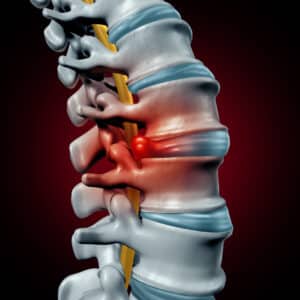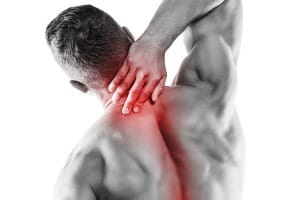A herniated disc, also known are a ruptured or slipped disc, is a damaged spinal cushion between two bones in the spine (vertebrae). Normally, the gelatinous discs between the vertebrae hold the bones in place and act as shock absorbers, permitting the spine to bend smoothly. When a disc protrudes beyond its normal parameters and its tough outer layer of cartilage cracks, the disc is considered to be herniated.
The inner material of the disc bulges through the torn cartilage, sometimes pressing on a nerve in the spinal canal. This results in back pain, often sciatic pain that extends into the buttocks and travels down the affected leg. Herniated discs occur most frequently in the lumbar (lower) region of the back and are one of the most common causes of such pain. Cervical (neck) discs may also herniate, resulting in pain in the neck and shoulders.

Causes of Disc Herniation
During the normal process of aging, the discs in the back lose flexibility and wear down. Additional stress may result in herniation. Such stress may result from obesity, heavy lifting, or sudden traumatic injury. Smoking is also a risk factor for disc herniation.
Symptoms
In addition to pain in emanating from the region of the herniation, patients may also experience numbness, tingling, muscle spasms or weakness. The pain that results from a herniated disc is usually worsened by moving and improved by rest. Sudden motions, such as bending or coughing, may elicit sharp, shooting pain.
Treatments
Contact Texas Neurosurgery to schedule an appointment to best determine which treatment options are right for you. Our award-winning doctors look forward to meeting you to ensure you receive the best possible healthcare to recover from disc herniation.
Cervical Disc Herniation
The doctors of Texas Neurosurgery are experts in providing personalized care for herniated discs in the Dallas area. When understanding disc herniation, it is important to know that intervertebral discs in between the bones of the vertebrae help to cushion the bones and allow for smooth and painless movement. Symptoms can arise when part of the disc material begins to protrude, known as a disc herniation, or when the disc begins to change, known as disc degeneration.

These conditions can cause neck pain that also radiates down the arm and weakness or numbness in the shoulder, arm or hand, as the different vertebrae cervical spine affects these areas. The pain comes from the affected disc putting pressure on a specific nerve root which determines where the pain is felt. Treatment for a herniated or degenerated disc includes immobilization of the neck, anti-inflammatory medication, physical therapy or surgery.
What our patients say about us
“My dad has had 2 surgeries with Dr. Bidiwala and he did great, my husband had neck surgery after 55 years of Pain! Best Surgeon without a doubt!”
“I would and already have recommended Dr. Christopher Michael as I am extremely well pleased with what he was able to do for me with my back surgery. After years of being told I might not walk if having this surgery I trusted Dr. Michael and I am thrilled to be walking and without pain. He is definitely a 5 Star, top notch surgeon.”
“Dr. Barnett is an excellent surgeon with a great bedside manner. His office staff are polite and professional. My medical care was handled in a professional and caring manner from my first office visit through my last post-op visit. I would highly recommend Dr. Barnett to others.”

